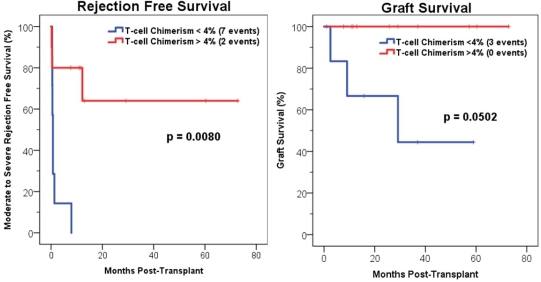The Protective Effect of Multivisceral Transplantation on Intestinal Allograft Rejection – Its Correlation with T-Cell Macrochimerism from a Long-Term Prospective Study
1Center for Liver Disease and Transplantation, Columbia University, New York, NY
2Columbia Center for Translational Immunology, Columbia University, New York, NY
3Department of Biostatistics, Columbia University, New York, NY.
Meeting: 2018 American Transplant Congress
Abstract number: 83
Keywords: Intestinal transplantation, Multivisceral transplantation, Rejection
Session Information
Session Name: Concurrent Session: Small Bowel: All Topics
Session Type: Concurrent Session
Date: Sunday, June 3, 2018
Session Time: 2:30pm-4:00pm
 Presentation Time: 2:42pm-2:54pm
Presentation Time: 2:42pm-2:54pm
Location: Room 210
Objective Graft rejection remains the crux of intestinal transplantation. Although liver-inclusive grafts appear to be protective, the mechanism remains unknown. We hypothesize that T-cell macrochimerism more commonly develops following multivisceral transplant (MVTx) and correlates with decreased graft rejection.
Methods T-cell chimerism was assessed from peripheral blood obtained at set intervals with multicolor flow cytometry. Macrochimerism was defined when donor T-cells represented >4% of T-cells in the recipient blood. We analyzed the correlation of macrochimerism with graft rejection and loss.
Results Seventeen patients underwent MVTx (n=8) or isolated intestinal transplant (iTx) (n=9) from 2011-2017, with a median follow-up of 26 months. T-cell macrochimerism developed in 10 patients and peaked within 28 days, lasting as long as 378 days (average 94 days). Patients with macrochimerism had a significantly higher moderate to severe rejection-free (p=0.008) and graft survival (p=0.050). Development of macrochimerism was more common in MVTx patients (6 of 8); thus MVTx was also associated with decreased rejection (p=0.020). Lack of macrochimerism was significantly associated with the development of Class I donor-specific antibodies (p=0.001). Only one patient developed self-limited GVHD. Furthermore, the balance of HLA disparities in the graft-versus-host and host-versus-graft directions did not correlate with blood macrochimerism (R2=0.277). 
Conclusions T-cell macrochimerism strongly correlates with clinical outcome in intestinal and multivisceral transplantation, providing a potential mechanism of tolerance and a powerful tool for guiding personalized immunosuppression.
CITATION INFORMATION: Liou P., Martinez M., Fu J., Velasco M., Griesemer A., Lobritto S., Vittorio J., Ravella S., Levin B., Emond J., Sykes M., Kato T. The Protective Effect of Multivisceral Transplantation on Intestinal Allograft Rejection – Its Correlation with T-Cell Macrochimerism from a Long-Term Prospective Study Am J Transplant. 2017;17 (suppl 3).
To cite this abstract in AMA style:
Liou P, Martinez M, Fu J, Velasco M, Griesemer A, Lobritto S, Vittorio J, Ravella S, Levin B, Emond J, Sykes M, Kato T. The Protective Effect of Multivisceral Transplantation on Intestinal Allograft Rejection – Its Correlation with T-Cell Macrochimerism from a Long-Term Prospective Study [abstract]. https://atcmeetingabstracts.com/abstract/the-protective-effect-of-multivisceral-transplantation-on-intestinal-allograft-rejection-its-correlation-with-t-cell-macrochimerism-from-a-long-term-prospective-study/. Accessed July 18, 2025.« Back to 2018 American Transplant Congress
